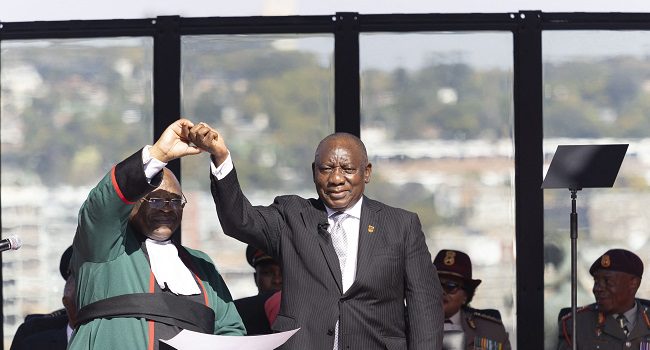Africa
Ramaphosa Begins Second Full Term as South Africa’s President

In 2019, Ramaphosa was reappointed for another five-year term after being elected by the South African parliament.
He came into office with promises of a new era for the country, focusing on tackling corruption and reforming the failing energy system. However, during his tenure, the economy struggled, plagued by power outages, and crime rates remained high, leading to an increase in unemployment to 32.9 percent.
In May, Ramaphosa’s party, the ANC, faced a significant setback in the elections, winning only 40 percent of the vote compared to their previous 57.5 percent.
This loss resulted in the ANC losing its absolute majority in parliament for the first time since democracy was established in 1994. To maintain power, the ANC formed a national unity government with other parties, including the Democratic Alliance, Inkatha Freedom Party, Patriotic Alliance, and GOOD party.
Despite facing opposition from the left, Ramaphosa secured his position as president with the support of 283 lawmakers in the National Assembly.
The inclusion of right-wing parties and the white-led Democratic Alliance drew criticism from the left, including Julius Malema’s Economic Freedom Fighters and former president Zuma’s uMkhonto weSizwe. As talks with coalition members continue, Ramaphosa is expected to announce his cabinet shortly after his inauguration.
In 2019, Ramaphosa was reappointed for another five-year term after being elected by the South African parliament. He came into office with promises of a new era for the country, focusing on tackling corruption and reforming the failing energy system.
However, during his tenure, the economy struggled, plagued by power outages, and crime rates remained high, leading to an increase in unemployment to 32.9 percent. In May, Ramaphosa’s party, the ANC, faced a significant setback in the elections, winning only 40 percent of the vote compared to their previous 57.5 percent.
This loss resulted in the ANC losing its absolute majority in parliament for the first time since democracy was established in 1994. To maintain power, the ANC formed a national unity government with other parties, including the Democratic Alliance, Inkatha Freedom Party, Patriotic Alliance, and GOOD party.
facing opposition from the left, Ramaphosa secured his position as president with the support of 283 lawmakers in the National Assembly.
The inclusion of right-wing parties and the white-led Democratic Alliance drew criticism from the left, including Julius Malema’s Economic Freedom Fighters and former president Zuma’s uMkhonto weSizwe. As talks with coalition members continue, Ramaphosa is expected to announce his cabinet shortly after his inauguration.
